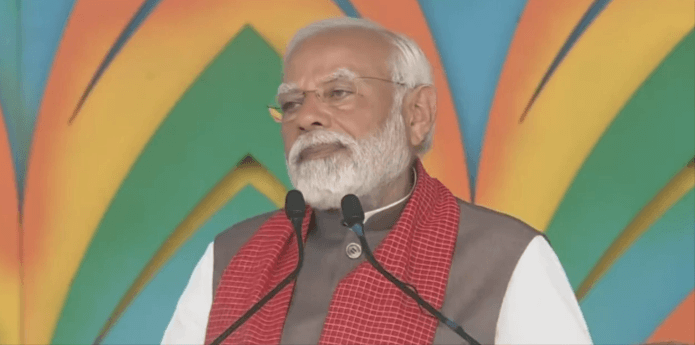On Tuesday, Prime Minister Narendra Modi inaugurated the India Energy Week 2024 in Goa and laid the foundation stone for schemes worth Rs 1,330 crore. The week-long event running from February 6-8 aims to attract global investors to India’s booming energy sector.
In his address, PM Modi highlighted India’s rapid economic growth, stating that experts predict India will soon become the world’s third largest economy. He emphasized the critical role the energy sector plays in India’s growth story.
Goa's progress and well-being of its citizens is our priority. Speaking at 'Viksit Bharat, Viksit Goa 2047' programme. https://t.co/l10PFuyiiq
— Narendra Modi (@narendramodi) February 6, 2024
India is already the world’s third largest energy consumer and has the third largest markets for oil, LPG, and automobiles. The country is also the fourth largest importer of LNG and has the fourth largest refining capacity.
Estimates suggest India’s primary energy demand will double by 2045, reaching 38 million barrels of oil per day, up from 19 million currently. Preparing for this massive growth, India is expanding its energy capabilities while ensuring affordable energy access across the country.
Despite global factors, petrol and diesel prices in India have declined over the past two years. The government has also achieved 100% electricity coverage, providing power to millions more homes. With rapid reforms, domestic gas production is rising substantially.
The focus is on increasing the share of natural gas in the primary energy mix from 6% to 15% by 2030, which will require $67 billion of investment. Plans are underway to boost oil refining capacity from 254 million metric tonnes per annum (MMTPA) today to 450 MMTPA by 2030.
India is building modern infrastructure worth over Rs 11 lakh crore this year. A significant portion will flow into the energy sector like railways, roads and housing. The massive push on infra will drive energy demand higher.
The government has started the Global Biofuel Alliance to promote biofuel adoption worldwide, with 22 countries and 12 organizations joining already. Rapid adoption in India has seen ethanol blending in petrol increase from 1.5% to 12% in 10 years, reducing emissions by 42 million metric tonnes.
The target is 20% blending by 2025. The PM stated India has expanded 20% blending from 80 to 9000 petrol pumps. The government is also working towards setting up 5000 compressed bio-gas plants across the country.
Despite its large population, India accounts for just 4% of global carbon emissions. The country aims to achieve net zero targets by 2070 through clean energy adoption.
The PM’s strong emphasis on India’s fast-growing energy demand presents a mammoth investment opportunity for global players. The policy push towards greener energy, increasing gas usage, biofuels adoption and green hydrogen will enormously benefit companies investing in India during this critical phase of expansion.
